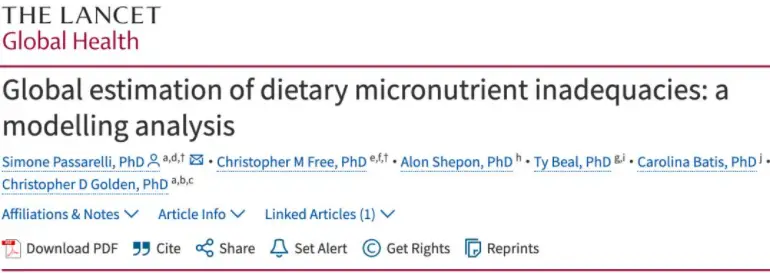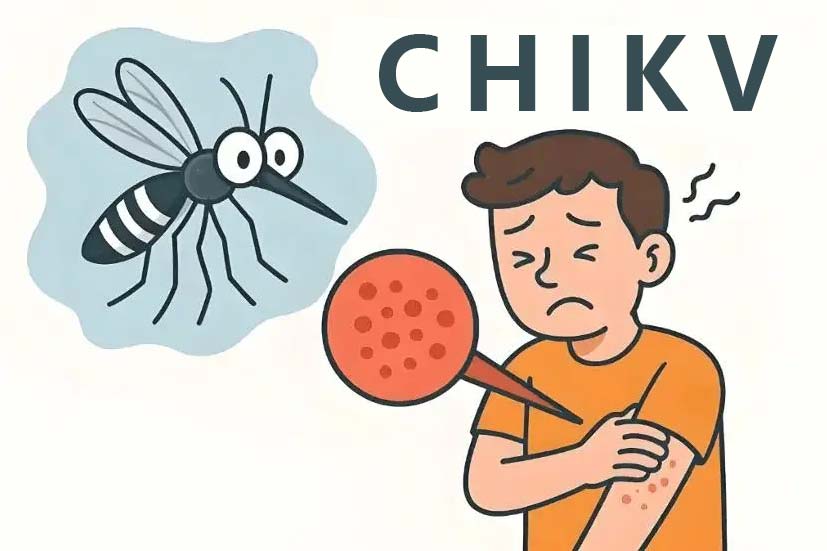Have you ever felt constantly sluggish, even though you haven't done any heavy work?
Even though you go to bed early every day, your memory is getting worse, and you forget things the moment you turn around?
This is likely not due to age or overwork, but rather a variety of minor health issues!

In 2024, The Lancet published a shocking study: Over 5 billion people have insufficient intakes of iodine, vitamin E, and calcium, while approximately 4 billion are deficient in iron, riboflavin, folic acid, and vitamin C...
This reveals that many people are already unaware of the "hidden nutrient hunger" they suffer from.

△Paper Screenshot
◆ Protein
The human body requires many nutrients, and protein is like our body's "jack of all trades," silently maintaining internal balance. Chronic protein deficiency can lead to subtle problems in the body, such as loss of appetite, weight fluctuations, anemia, and a general decline in overall performance.

For children, insufficient protein can even affect development, leading to slower growth and difficulty focusing on learning.
For this reason, maintaining adequate daily protein intake is crucial. It's recommended to choose high-quality protein, such as eggs, fish, soy products, and lean meat, to accelerate absorption and utilization.

◆ Glucosamine
Joint cartilage acts as a soft cushion, absorbing shock from bones during movement.
However, if glucosamine levels are insufficient, the cushion can't be renewed and repaired, gradually becoming thinner and brittle.
You might once have been able to squat and climb stairs easily, but now you might be unable to stand up after squatting, and experience dull knee pain...

Research shows that glucosamine levels begin to decline at age 30, reaching only 18% of what they were at age 18 by age 45, and are nearly depleted by age 60. Therefore, timely supplementation of glucosamine, combined with chondroitin, calcium, and other nutrients, is a crucial investment in joint and bone health.
◆ Omega-3 fatty acids
Have you noticed that some people around you eat a lot and exercise little, yet have no health problems, while others, despite being very careful, develop high blood pressure and high cholesterol early on? This is largely due to a key nutrient: omega-3 fatty acids.
Even more surprising is that research has found that approximately 85% of people worldwide have insufficient omega-3 intake.
If you find yourself prone to dry eyes, forgetfulness, frequent inflammation, and elevated blood lipids, this may be your body's way of reminding you that it's time to supplement with omega-3s...

Omega-3s are essential nutrients that the human body cannot synthesize on its own. Their main sources include deep-sea fish (such as salmon and krill) and plant-based foods like flaxseed.
In modern life, many people use deep-sea fish oil as their primary form of daily omega-3 supplementation.

◆ Vitamins and Minerals
Although vitamins and minerals aren't consumed in large quantities daily, they are crucial to your health.

For example:
- Insufficient B vitamins can lead to fatigue and weakness, making everything feel exhausting.
- Inadequate iron, folic acid, and B12 intake can lead to poor blood circulation, resulting in dizziness after standing up after squatting for a long time.
- Inadequate intake of vitamin C, zinc, and selenium can lead to catching colds more easily with the changing seasons and making you a frequent target of viruses.
- Deficiencies in vitamins E, B6, and magnesium can lead to dry, itchy, and flaky skin, as well as poor memory.
In daily life, the appropriate use of multivitamin and mineral supplements can serve as a supplemental means of supplementation. However, it's important to emphasize that supplements are supplementary and cannot replace medication.

%20--%3e%3c!DOCTYPE%20svg%20PUBLIC%20'-//W3C//DTD%20SVG%201.1//EN'%20'http://www.w3.org/Graphics/SVG/1.1/DTD/svg11.dtd'%3e%3csvg%20version='1.1'%20id='图层_1'%20xmlns='http://www.w3.org/2000/svg'%20xmlns:xlink='http://www.w3.org/1999/xlink'%20x='0px'%20y='0px'%20width='256px'%20height='256px'%20viewBox='0%200%20256%20256'%20enable-background='new%200%200%20256%20256'%20xml:space='preserve'%3e%3cpath%20fill='%23FFFFFF'%20d='M194.597,24.009h35.292l-77.094,88.082l90.697,119.881h-71.021l-55.607-72.668L53.229,232.01H17.92%20l82.469-94.227L13.349,24.009h72.813l50.286,66.45l58.148-66.469V24.009z%20M182.217,210.889h19.566L75.538,44.014H54.583%20L182.217,210.889z'/%3e%3c/svg%3e)




